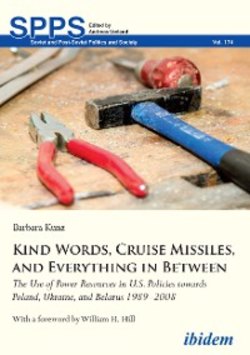Читать книгу Kind Words, Cruise Missiles, and Everything in Between - Barbara Kunz - Страница 3
ОглавлениеTable of Contents
Preface
Abbreviations
I Introduction
I.1 The background
I.1.1 Preserving the unipolar moment
I.1.2 On the ground: the U.S. in Central and Eastern Europe
I.2 Empirical objectives
II The theoretical framework and methodology
II.1 Introduction and research questions
II.1.1 Neoclassical realism: an introduction
II.1.2 Elite perceptions: of more than just the system?
II.2 Non-friends, friends and undecided states
II.2.1 Non-friends
II.2.2 Friends
II.2.3 Concluding remarks: undecided states
II.3 Two types of power resources and foreign policy tools
II.3.1 Power in political realism
II.3.2 Positive and negative power: the relevance of base values
II.3.3 Negative power and its bases
II.3.4 Positive power and its bases
II.3.5 Power resources and foreign policy tools
II.4 Linking states' friend / non-friend / undecided status to power
II.5 Concluding remarks on the theoretical framework
II.6 Methodological considerations
II.6.1 The cases
II.6.2 Sources
II.6.3 Research design: Comparative case studies
II.6.4 Three steps in addressing the sources
III U.S. Foreign Policies Towards Poland
III.1 Introduction
III.2 Laying the foundations: the U.S. and Solidarność
III.2.1 Accompanying Poland to de facto independence 1989–1991
III.2.2 Foreign Policy Tools in Solidarność-times
III.3 An emerging new best friend in Europe: the second Gulf War and NATO enlargement
III.3.1 Euro-Atlantic integration or: Overcoming Yalta
III.3.2 Foreign policy tools 1991 to 2000
III.4 The heydays and their aftermath: 2001 onwards
III.4.1 State Tourism: Bush, Kwaśniewski and the Iraq war
III.4.2 Foreign policy tools 2001 to 2005
III.5 After Kwaśniewski: 2005 onwards
III.5.1 The double Kaczyński era
III.5.2 Donald Tusk, the conclusion of the Missile Defence Agreement—and still no visa waiver programme
III.5.3 Foreign policy tools after Kwaśniewski
III.6 Conclusions on U.S. foreign policies towards Poland 1989–2008
IV U.S. Foreign Policies Towards Ukraine
IV.1 Introduction: America's recognition of Ukraine's independence
IV.2 The early years: Moscow-centrism and a focus on nuclear non-proliferation 1991 to 1994
IV.2.1 Solving the nuclear question
IV.2.2 The Lisbon Protocol and Ukraine's accession to the NPT as a nuclear-free state
IV.2.3 Foreign Policy Tools in solving the nuclear question
IV.3 Conventional non-proliferation: Ukraine's accession to the MTCR, Bushehr and the Satellite Deal 1994 to 1998
IV.3.1 Getting Ukraine to join the MTCR
IV.3.2 The Policy of issue linkage: non-proliferation, nuclear power plants and satellites
IV.3.3 Foreign Policy Tools in making Ukraine join the MTCR
IV.4 Euro-Atlantic integration: Ukraine in its wider context 1994 to 2004
IV.4.1 The U.S.-Ukrainian honeymoon: broadening relations
IV.4.2 Setbacks and frustration
IV.4.3 Multilateralising Ukraine's transformation: Ukraine and NATO
IV.4.4 Foreign Policy Tools in promoting Ukraine's Euro-Atlantic integration
IV.5 After the Orange Revolution: diminished U.S. interest 2004 to 2008
IV.5.1 Few illusions left: the Orange Revolution and its aftermath
IV.5.2 Foreign policy tools 2004 to 2008
IV.6 Conclusions on U.S. foreign policies towards Ukraine
V U.S. Foreign Policies Towards Belarus
V.1 Introduction: At odds with the West
V.2 Belarus and the US: the early years
V.2.1 Belarus: The unproblematic answer to the nuclear question
V.2.2 Foreign policy tools in early U.S.-Belarusian relations
V.3 Lukashenka and "Selective Engagement" with Minsk
V.3.1 Rigged elections and referenda: Deteriorating relations
V.3.2 The Belarus Democracy Act
V.3.3 Political Prisoners, Sanctions and Personae Non Gratae
V.3.4 "Selective engagement" and foreign policy tools
V.4 The wider context: Belarus in international politics
V.4.1 The Bush II era: Belarus as a rogue state?
V.4.2 Belarus and Euro-Atlantic Integration
V.4.3 The wider context and foreign policy tools
V.5 Conclusions on U.S. foreign policies towards Belarus 1991–2008
VI Conclusions
VI.1 Returning to the research questions
VI.2 Empirical findings: U.S. post-Cold War policies towards Poland, Ukraine and Belarus
VI.3 Implications for theory building: linking status to power
VI.3.1 Friends, non-friends and undecided states: an element of the missing link
VI.3.2 A category of its own: undecided states
VI.3.3 Positive and negative power as means to shape and control the environment
VI.4 Final remarks
Annex
High-level contacts between the U.S. and Poland, Ukraine and Belarus
References
Primary Sources
Speeches, Press Releases and Briefings*
Background Notes
Treaties, Laws, Reports and Official Strategies
Websites
Books and Articles
Media Sources
Soviet and Post-Soviet Politics and Society
Copyright
